Occupation, evacuation, digitisation: recent history of Ukrainian universities
Published: 16 January 2024
Text – Tetiana Preobrazhenska, URAN
English adaptation – Rosanna Norman, GÉANT
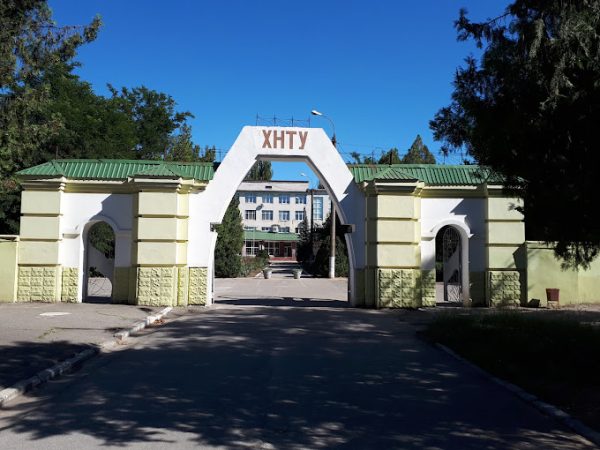
Oleksandr Melnychenko from the Kherson National Technical University and Yevhenii Preobrazhenskyi from the URAN Association, the National Research and Education Network (NREN) of Ukraine, talk about the experience of the university under the Russian occupation and how research and education (R&E) institutions can overcome wartime challenges with the support of digital technologies.
URAN: the impact of the war
The mission of URAN, with the aid of digital technologies, is to make education and science in Ukraine contemporary and innovative so that they take their rightful place in the international arena.
“We provide universities and research institutions with access to network technologies and digital services specifically designed for scientists and educators” Yevhenii Preobrazhenskyi, executive director of URAN, explains. “For example, we assist in establishing distance learning and international cooperation, constructing the institution’s internal network. We offer access to electronic research infrastructures and secure channels for the swift exchange of big scientific data.”
After the start of the full-scale war URAN’s workload increased significantly; educators and researchers required additional support in challenging circumstances and conditions. For instance, even the regular task to ensure the network’s functionality had to be conducted during rocket attacks and power outages.
“The URAN infrastructure reflects the changes around it and thus it is changing too” Yevhenii Preobrazhenskyi says. “We are restructuring the network architecture to reduce the number of energy-dependent nodes and almost entirely shift the URAN network to fiber-optic non-switched connections. The network will operate even in the absence of electricity, ensuring that users do not remain without services.”

URAN: new needs of educators and researchers
The war has created new needs among URAN users. Some are common for all research and education institutions, such as the critical need to secure data, as the physical IT infrastructure can be destroyed by enemy rockets or drones. To prevent data loss, URAN offers universities and research institutions the option to migrate their IT infrastructure to the cloud of foreign providers. Specifically, to the AWS and Microsoft Azure clouds, which have been providing their services for free since the beginning of the war.
Currently, URAN, alongside international and Ukrainian partners, is developing a mechanism that will enable Ukrainian R&E institutions to access these cloud services with significant discounts. This is made possible through URAN’s participation in GÉANT and OCRE.
“The joint initiative with GÉANT and OCRE is highly significant, the success of this project determines the future work of many educators and scientists in Ukraine” Yevhenii Preobrazhenskyi emphasises.
Another need for universities is to ensure access to the university network for students who, because of the war, find themselves in different parts of Ukraine and the world. They gain such access through eduroam, a global WiFi roaming service for the R&E community. In nearly two years since the war started, URAN has connected ten institutions to this service.
Some URAN users were more affected by the war than others and, therefore, they needed special assistance. Among them Kherson National Technical University (KNTU).
KNTU: a university under occupation
The southern city of Kherson found itself in the combat zone from the first days of the full-scale Russian invasion started in February 2022. The buildings of KNTU were significantly damaged, and the university shifted to remote operations. Within a few days, Kherson was occupied, and KNTU, along with the majority of students and staff, became isolated from the rest of Ukraine. Evacuating people and assets became impossible.
Oleksandr Melnychenko, the head of the IT department at KNTU, together with colleagues, started searching for technical sites where they could place the university’s information resources and systems in cloud storage. It was then that URAN offered the university virtual machines from AWS.
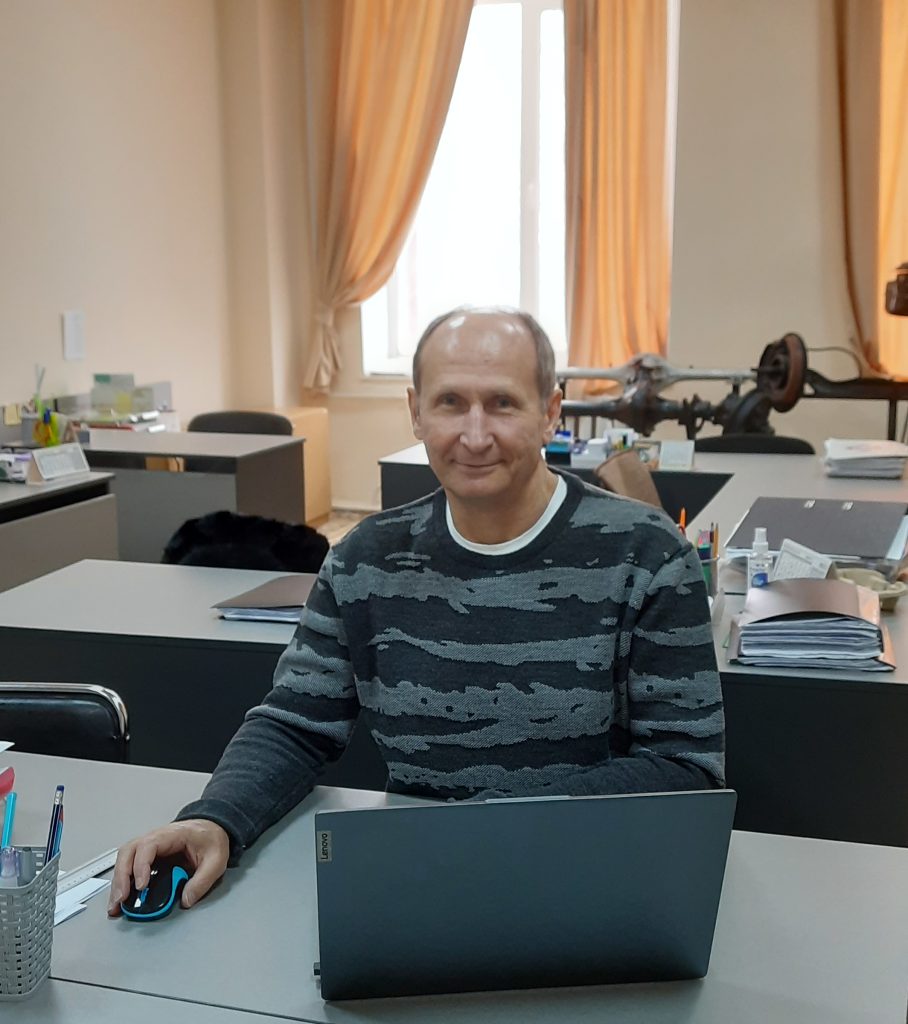
“It was a complex and lengthy process that continues to this day” Oleksandr Melnychenko recalls. “First and foremost, we were rescuing information that existed only in paper format. We scanned the originals daily and uploaded digital copies to the cloud. We did this until July 2022 when the university premises were taken over by the occupying military administration.”
At the same time, the KNTU Technical team worked with data that already existed in electronic format: they transferred it to cloud storage and deleted it from computer systems in occupied Kherson. Then, the team rendered these systems inoperable to prevent their use by the occupiers.
The team conducted data transfers during non-operational hours, allowing classes to continue as scheduled. When the occupiers seized KNTU and cut off power to the data centre, users didn’t even notice it, as critical digital services had already been swiftly restored in the cloud.
The evacuation of the university to the western city of Khmelnytskyi happened gradually as people looked for ways to leave the occupied area and reach Khmelnytskyi.
“Initially, many had to escape abroad before returning to Ukraine, back to their native KNTU” says Oleksandr Melnychenko, who also had to overcome a challenging journey from Kherson. “A portion of the university staff remained in the city; some, despite the danger, went to work daily. Thanks to their dedication, teaching continued without significant interruptions. During that time, they even organised the defense of a thesis for a Doctor of Philosophy degree. For students who couldn’t evacuate on time and were stranded in the university dormitory without family support or means of sustenance, KNTU staff organised food purchases and assisted in the preparation of hot meals.”
URAN: a network under occupation
Before the start of the war, nearly all universities in Kherson were users of the URAN network. This enabled them to work with their information systems both locally and remotely, even during the occupation.
KNTU has a long history of fruitful collaboration with URAN, and during the war, the university personnel did their best to restore and maintain the local segment of the URAN network. During the first months, the network provided internet access to educators in Kherson — particularly those who continued to reside in the dormitories of KNTU, the Agrarian and Economic University, and the Maritime Academy.
However, in the occupied Kherson, the URAN network helped not only educators. When the occupiers started shutting down the mobile operators in the city, most residents lost access to the internet, but KNTU used the URAN network and deployed WiFi zones on the first floors of university buildings and dormitories using equipment obtained from URAN prior to the full-scale invasion.
“Our technicians, operating remotely, were able to open free access to these WiFi networks” Oleksandr Melnychenko explains. “People started gathering near the university buildings and dormitories to take advantage of the opportunity to finally communicate with their loved ones and find out the latest news.”
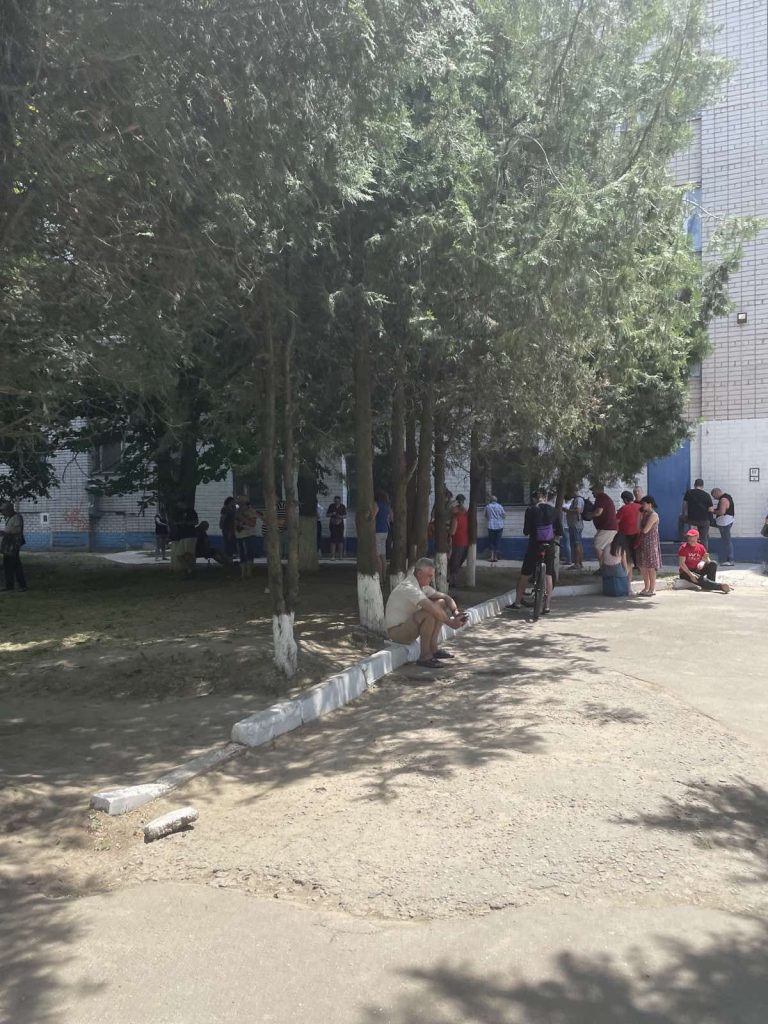
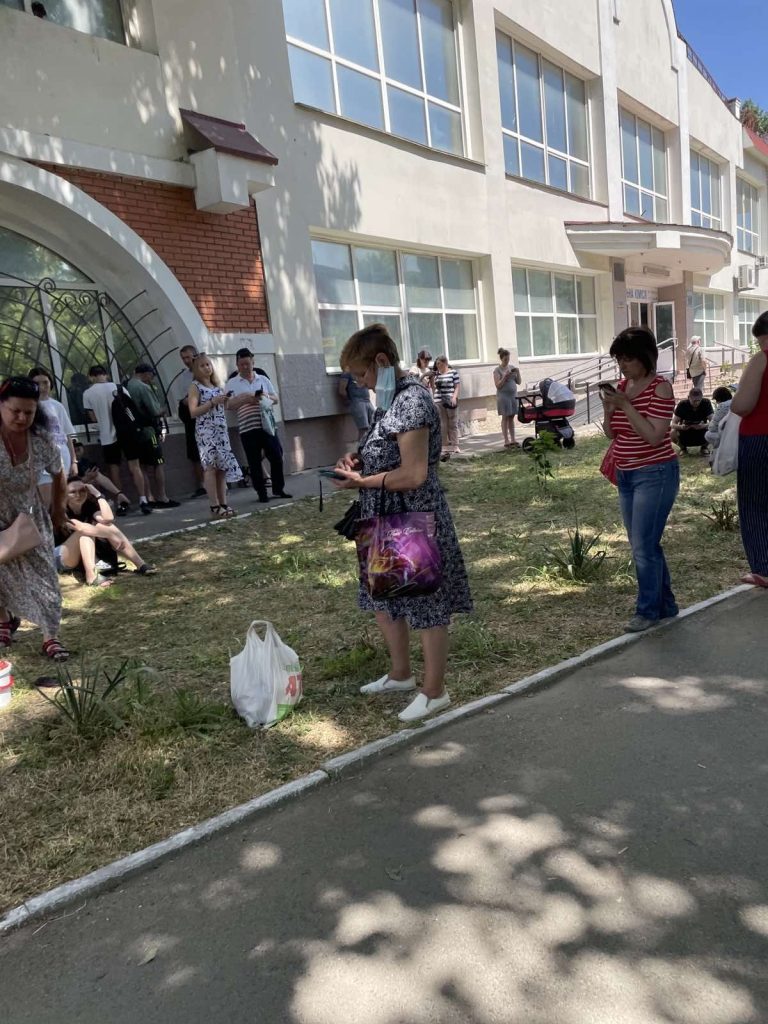
Residents of Kherson gather near the dormitory (on the left) and the 6th academic building (on the right) of the Kherson National Technical University to connect to the internet, summer 2022
KNTU and URAN: supporting the university in the evacuation
In Khmelnytskyi, KNTU received assistance from URAN specialists from the very beginning. They quickly connected the new university premises to the URAN network via fiber-optic channels. They provided equipment for wired and wireless networks free of charge. Over time, as the number of premises available to the university in the new location increased, URAN, as per KNTU’s request, provided additional network equipment.
“So far, the majority of the equipment that ensures the operation of our computer network in Khmelnytskyi is provided by URAN” Oleksandr Melnychenko noted.
He considers the swift restoration of the university’s full operation at the new location a truly significant achievement, as it was simply impossible to organise the relocation of people, property, documents and informational resources from Kherson to Khmelnytskyi across the front line.
“Not all institutions from the occupied territories managed to preserve and restore their information systems. We succeeded thanks to the dedication of our employees who repeatedly risked their lives, and thanks to the collaboration with domestic and international partners. This fruitful collaboration had been developed over the years in times of peace.”
KNTU: life 'in two homes'
From the first day of the war, the KNTU team rallied in each other’s support. Those who were able to leave the occupied area helped those who stayed behind with the dissemination of information about humanitarian aid, drinking water distribution and evacuation possibilities. They collected requests for medications, purchased them and sent them to the occupied territory and even money to those who suddenly found themselves in dire straits.
After the de-occupation of Kherson in November 2022, the Khmelnytskyi part of the university team extended broader support to Kherson by procuring and sending essential items such as autonomous generators, flashlights, video surveillance tools and warm clothing. With the support of institutions in Khmelnytskyi and some charitable organisations, they collected and delivered to Kherson the first truckload of humanitarian aid. Such shipments continue to this day as Kherson is located near the front line where civilians are still being killed almost daily by the regular Russian shelling.
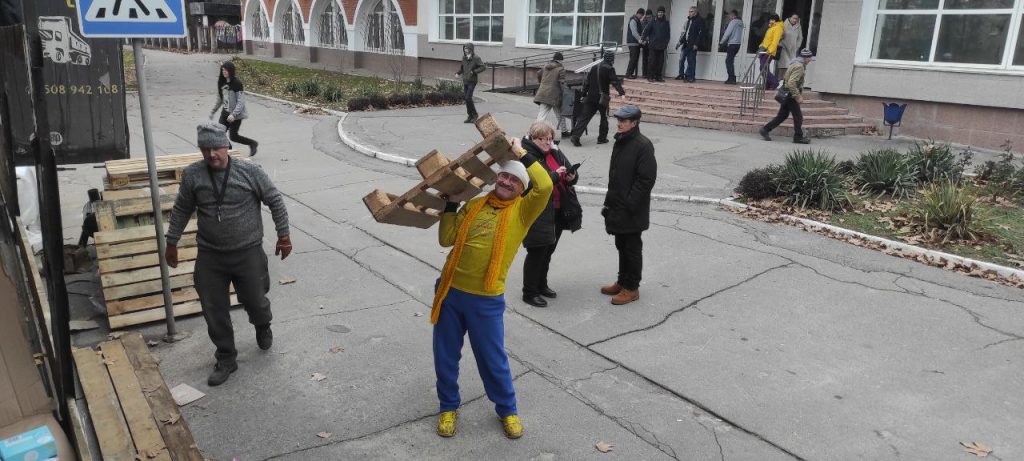
The university continues to live ‘in two homes’. Staff and students reside in both Kherson and Khmelnytskyi and regularly commute between the two locations; some have found refuge in other cities across Ukraine. Work and study are conducted in a hybrid mode: both at the university premises (when the security situation allows it) and remotely.
“In the summer of 2023, we gathered in Khmelnytskyi for the rector’s election” Oleksandr Melnychenko says. “Currently, we are looking to rotate staff members between Kherson and other cities and Khmelnytskyi for a few weeks also to help improve the teams’ psychological well-being.”
URAN: team, achievements, and partnership support
The director of URAN, Yevhenii Preobrazhenskyi, also notes that the challenges have brought people closer.
“Over the long months of war, our small team has become almost like a family,” he says.
His team is significantly smaller than the large university teams of KNTU or other users of the URAN network, it’s a nine-person team based in Kyiv. They ensure the functionality of the network and services, without which it would be difficult, if not impossible, for universities to operate.
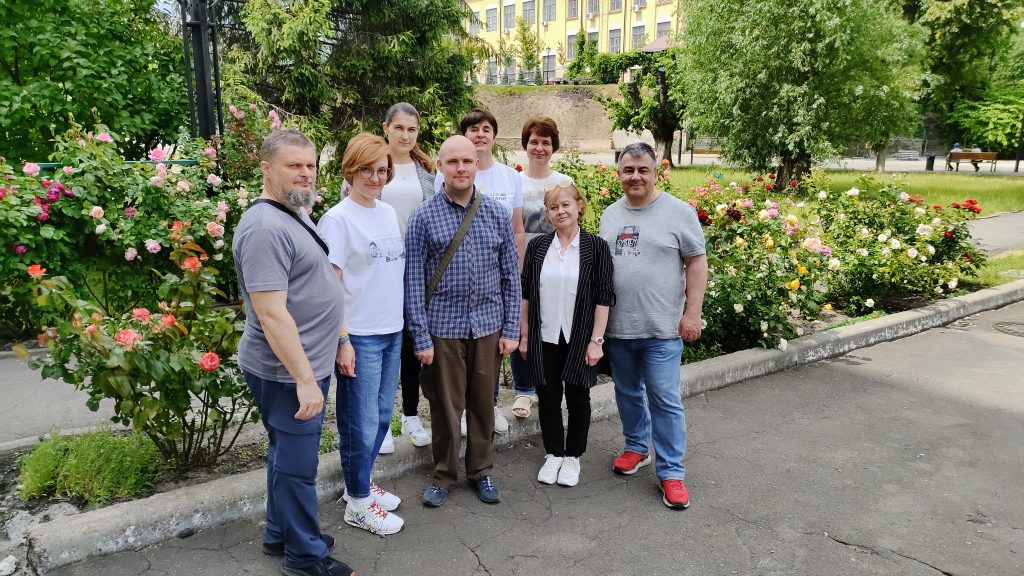
“Our most significant achievement in these challenging times is that URAN exists, it functions and it not only sustains itself, but it also assists education and scientific institutions, particularly universities. In times of war, the most crucial objective is to save people, preserve knowledge and help disseminate it among our youth through Ukrainian universities such as KNTU,” Yevhenii Preobrazhenskyi believes.
He also emphasises that URAN would not be able to operate without the support of the GÉANT community: “This support is invaluable, and we will never cease to express our gratitude. URAN is in the same situation as Ukraine as a whole: our internal resources are not sufficient for a prolonged confrontation with Russia, whose resources are significantly larger.”
Rest can only come after victory
In answer to a question about changes in their personal lives during the war, Oleksandr and Yevhenii responded in a similar way.
“Personal life now boils down to surviving and helping my family, my university and my country achieve victory”.
Oleksandr Melnychenko, KNTU.
“My working day lasts at least 12 hours, and after that, I only have enough energy left to sleep. This is not just my lifestyle, it’s the same for most people in the URAN team, as well as across Ukraine. Our task list was already long in peacetime, but now we must be even more efficient. The volume of our duties leaves no time for proper rest”.
Yevhenii Preobrazhenskyi, URAN.
However, they both acknowledge that their energy is not limitless and requires restoration, so they try to give themselves some breaks. Yevhenii enjoys walks around Kyiv, while Olexandr prefers to relax through music.
“I appreciate the compassionate attitude of the people of Khmelnytskyi towards those displaced by the war, ” he says. “For example, the Khmelnytskyi Philharmonic offers us free access to their concerts. Classical, contemporary and organ music is excellent distraction from worries.”
Dreams and plans
Despite the exhausting months of war behind them and the uncertainty ahead, URAN and their users allow themselves to dream and plan. They dream of peace and plan for development.
“The priority is the development of IT within the university” Oleksandr Melnychenko says. “We have a digitalisation plan based on the experience of leading universities in Ukraine and the world. We lack resources, primarily personnel, but we are deepening cooperation with other universities and organisations, including URAN and the pan-European research and education network GÉANT. We plan to rebuild the information and communication infrastructure of the university in Kherson. To achieve this, we engage partners and apply for grants.”
URAN is working on a new strategy for sustainable development as economic difficulties become more pronounced.
“The war-induced needs of scientific and education institutions have caused the increase of URAN’s workload” Yevhenii Preobrazhenskyi explains. “Therefore, additional staff and funds are required for network development and restoration. We need to review our current work principles and develop a new strategy for sustainable development. This strategy will outline our actions both during and after the war. Our immediate task is to save URAN and its members of staff while continually supporting universities and research institutions. Looking forward, our further goal is to integrate Ukrainian institutions into the European scientific and educational space. We plan to develop and implement digital services and technologies that incorporate European expertise and will be beneficial for our R&E institutions in the post-war period when Ukraine starts recovering and developing alongside the rest of Europe.”